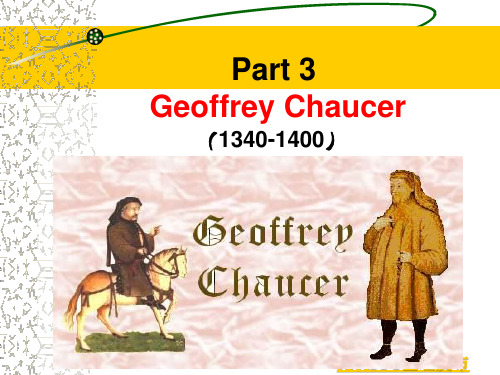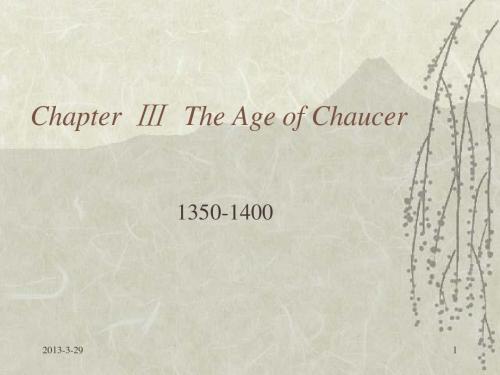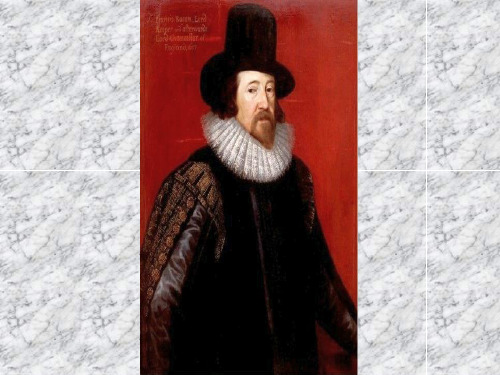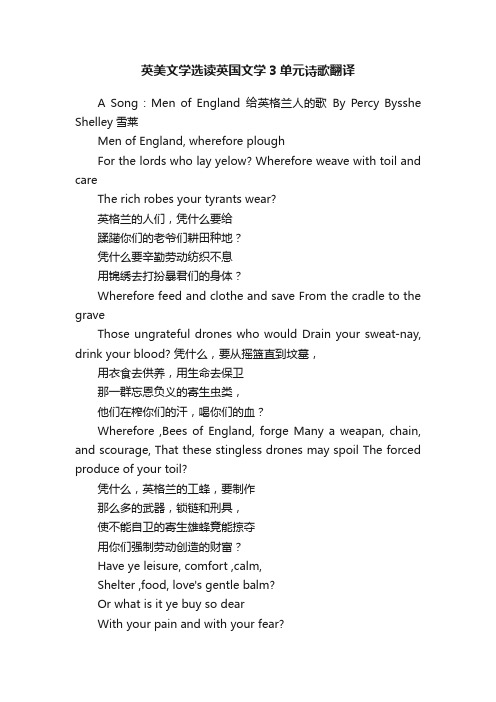英国文学3部分
英国文学课3--the third section--Chaucer

III. Close reading of the part “General Prologue”
• 2. Summary: see textbook • 3. Analysis of some parts of it:
IV. Popular Ballads:
• 1. Definition: • Ballads are anonymous narrative songs that have been preserved by oral transmission.
• The iambic pentameter couplet came to be called "heroic" because by the middle of the seventeenth century it was regarded as the proper form for dealing with "heroic" subjects--deeds of high accomplishment and matters of public interest and admiration--"proper" because it appeared to fit fairly unobtrusively the prose rhythms of the English language (long considered to be basically iambic) and because the fivestress line seemed most often to provide dignity and distance without intruding too much formality
英国文学选读unit3

Unit3 Francis Bacon (I561-1626)
Of Marriage and Single Life Of Studies
Francis Bacon (1561—1626)
• Francis Baconholas Bacon, Keeper of the Privy Seal to Queen Elizabeth.He went to Cambridge University at twelve. He took up law after graduation, and soon became successful. He became a member of the House of Commons(下议院) at the age of twentythree. His alliance with the bourgeoisie(中 产阶级) offended Queen Elizabeth who, up until that time had liked him. When James I came to the throne, Bacon became Lord Chancellor and was made a knight in 1618. In the course of his climbing to the top, however, he made enemies who brought about his final downfall. He died in disgrace in 1626.
paragraph. • b. the conciseness of expressions and phrases presents a plain style as well as
英国文学史及选读课件 3 Geoffrey Chaucer

iambic pentameters an unstressed syllable followed by a stressed one.
The heroic couplet
The origin of this form in English poetry is unknown, but Geoffrey Chaucer in the 14th
century was the first to make extensive广泛的 use of it. The heroic couplet became the principal meter used in drama about the mid-17th century, and the form was perfected by John Dryden and Alexander Pope…
Features: 1). a story told in song; 2). usually in 4-line stanzas(诗)节,段 with the 2nd and the 4th lines rhymed.
Popular ballads are songs and ballads which were widespread among the populace民众,老百姓 of England and Scotland and created and preserved by the people.
6. Chaucer displays his humor and irony as he condemns the vicious邪恶的; 堕落的;恶意的;恶毒的 characters.
III. Close reading of the part ―General Prologue开场白,序幕 ‖
英国文学简史Part Three The Period of the English Bourgeois Revolution

Part Three The Period of the English Bourgeois Revolution第三部分英国资产阶级革命时期I The English Revolution and the Restoration 英国革命和复辟Literature of the Revolution Period 革命时期的文学:The spirit of unity and feeling of patriotism ended with the reign of Elizabeth I, and England was then convulsed with the conflict between the two antagonistic camps, the Royalists and the Puritans. English literature of this revolution and restoration period was very much concerned with the tremendous social upheavals of the time. Milton, one of the greatest poets of England, defended the English Commonwealth with his pen.随着伊丽莎白一世统治的结束,人们统一的精神和爱国主义的感情也随之而去。
英国因为量大对抗阵营——保皇党和清教徒的冲突而骚乱。
英国革命和复辟时期的文学主要与当时的社会巨变有关。
英格兰最伟大的诗人之一弥尔顿用他的笔来捍卫英国共和制。
II Milton 弥尔顿1.Life and Work 生平和作品(1)Life: John Milton was born in London in 1608.约翰·弥尔顿1608年出生于伦敦。
英国文学史及作品选读 Chapter 3

2. The two contemporaries of Chaucer:
John Wycliff: The “Father of English prose”. He translated the Bible into Middle English. William Langland: The Vision of Piers Plowman. An allegory.
2011-6-19
11
Notes (1)
prioress: (Madam Eglantyne) A nun in charge of a priory or ranking next below the abbess of an abbey. 小女隐修院院长或大女隐修院副院长 parson: An Anglican cleric with full legal control of a parish under ecclesiastical law; a rector. 教区牧师英国英车圣公会牧师,在基督教法律 下拥有对一个教区的完全的法律控制权;教区 长
2011-6-19
3
3. Geoffrey Chaucer (ca. 1343-1400)
Life: Born urban middle class; In the service of the ruling class; The diplomatic mission that sent Chaucer to Italy in 1372 was a milestone in his literary development. He had direct contact with the Italian Renaissance. Perhaps he acquired manuscripts of works by Dante, Petriarch, and Boccaccio.
英国文学简史 (刘炳善著 河南人民出版社)笔记part3-4

Part three the period of the English bourgeois revolution Chaper 1 the English revolution and the Reatoration1 the weakening of the tie between monarchy and bourgeoise2 the clashes between the king and parliament3 the outburst of the English revolution:4 the split with the revolution camp5 the bourgeois dictatorship and the restoration6 the religious cloak of the English revolution:Also called the puritan revolution.Puritanism is the religious doctrine7 literature of the revolution periodChapter 2 John Milton约翰•弥尔顿1608~1674(诗人、政论家;失明后写《失乐园》、《复乐园》、《力士参孙》。
)①Epics: <Paradise Lost>失乐园: written in blank verseIn the poem god is no better than a despot. God is cruel and unjust. Adam and Eve embody Milton's belife in the powers of man.The desription of hell, Satan is the real hero of the poem. Satan is the spirit questioning the authority of God.<Paradise Regained>复乐园②Dramatic poem: < Samson Agonistes>力士参孙:A poetical drama.③<Areopagitica>论出版自由: as a declaration of people's freedom of the press, has been a weapon in the later democratic revulotion struggles.<The Defence of the English People>为英国人民声辩: as the spokesman of the revolution.④<On His Blindness>我的失明This sonnet is written in iambic pentameter rhymed in abba abba cde cde, typical of Italian sonnet.Its theme is that people use their talent for God, and they serve him best sho can endure the suffering best.Milton:1 he was a political in both his life and his art. He was a militant pamphleteer of the English Revolution, and the greatest English revolutionary poet in 17th century2 wrote the greatest epic in English literature. He and Shakespeare have always been regarded as two patterns of English verse3 he first used blank verse in non-dramatic works. In paradise lost, he acquires an absolute mastery of the blank verse.4 he is a great stylist, grand style.5 his sublimity of thought and majesty of expression.Chapter 3 John Bunyan约翰•班扬1628~1688(代表作《天路历程》,宗教寓言,被誉为“具有永恒意义的百科全书”,是英国文学史上里程碑式著作。
英国文学选读课件Unit 3 Francis Bacon

VI Useful on-line references for further study
I Bacon’s position and contribution
II A brief introduction to Bacon's Essays
1. Actual size • a collection of essays • the first published book in 1597 with 10 essays • a much-enlarged second edition in 1612 with 38 essays • the third published book in 1625 with 58 essays.
• about rumination on the subject of marriage and single life with all its pros and cons.
2. Discourse analysis
• Bacon's point of view: - wives and children, - impediment to great enterprises, or great deeds; - not necessarily a bad thing, - a virtue for both the wife and the children and even for the society; - marriage a good thing on the whole.
and some few to be chewed and digested.” 书有可浅尝者,有可吞食者,少数则须咀嚼消化。
英美文学选读英国文学3单元诗歌翻译

英美文学选读英国文学3单元诗歌翻译A Song : Men of England给英格兰人的歌By Percy Bysshe Shelley雪莱Men of England, wherefore ploughFor the lords who lay yelow? Wherefore weave with toil and careThe rich robes your tyrants wear?英格兰的人们,凭什么要给蹂躏你们的老爷们耕田种地?凭什么要辛勤劳动纺织不息用锦绣去打扮暴君们的身体?Wherefore feed and clothe and save From the cradle to the graveThose ungrateful drones who would Drain your sweat-nay, drink your blood? 凭什么,要从摇篮直到坟墓,用衣食去供养,用生命去保卫那一群忘恩负义的寄生虫类,他们在榨你们的汗,喝你们的血?Wherefore ,Bees of England, forge Many a weapan, chain, and scourage, That these stingless drones may spoil The forced produce of your toil?凭什么,英格兰的工蜂,要制作那么多的武器,锁链和刑具,使不能自卫的寄生雄蜂竟能掠夺用你们强制劳动创造的财富?Have ye leisure, comfort ,calm,Shelter ,food, love's gentle balm?Or what is it ye buy so dearWith your pain and with your fear?你们是有了舒适,安宁和闲暇,还是有了粮食,家园和爱的慰抚?否则,付出了这样昂贵的代价,担惊受怕忍痛吃苦又换来了什么?The seed ye sow, another reaps;The wealth ye find, another keeps;The robes ye weave, another wears;The arms ye forge, another bears.你们播下了种子,别人来收割;你们找到了财富,归别人占有;你们织布成衣,穿在别人身上;你们锻造武器,握在别人的手。
- 1、下载文档前请自行甄别文档内容的完整性,平台不提供额外的编辑、内容补充、找答案等附加服务。
- 2、"仅部分预览"的文档,不可在线预览部分如存在完整性等问题,可反馈申请退款(可完整预览的文档不适用该条件!)。
- 3、如文档侵犯您的权益,请联系客服反馈,我们会尽快为您处理(人工客服工作时间:9:00-18:30)。
Part ThreeThe Period of the English Bourgeois RevolutionChapter 1The English Revolution and the Restora tion1. The Weakening of the Tie between Monarchy and BourgeoisieThe T udor Dynasty: harmony (interests in commo n →collaboration)The end of Elizabe th’s reign: conflict (quarrels)2. The clashes between the King and ParliamentMonopolies on merchandiesCharles I dissolved it in 1629.3. The Outburst of the English Revolution(1) broke out in 1642 and lasted till 1649.(2) T wo camps:The royalists: conservative gentry, big landlords, monopolistsThe opposition leaders in Parliament: the merchants, artisans and apprentices, the peasants (Oliver Cromwell) (3) Result:Monarchy was abolished.England was declared a commonwealth (a republic)4. The Split within the Revolutionary CampThe middle bourgeoisie (Independents)The big bourgeoisie (Presbyterians)The petty bourgeoisie“The Movement of the Diggers” (掘地运动)1.The Bourgeois Dictatorship and the Restoration(1)The big bourgeoisie made a compromise with the feudal remnants.(2)After the death of Cromwell, the Parliament recalled Charles II to England in 1660.→the RestorationPeriod(3)The Bourgeoisie invited William to be King of England in 1688.→the “Glorious Revolution” (bloodless, norevival of the revolutionary demands)(4)The state structure of England was settled→Capitalism could develop freely.2.The Religious Cloak of the English Revolution(1)the English Revolution≈the Puritan Revolution(2)Puritanism:①②③④Puritan literature is different from the literature of Elizabethan Period(1558-1625)in the following three aspects:1) Elizabethan literature had a marked unity and the feeling of patriotism and devotion to the Queen, but in the Revolution Period,all this was changed, the king became the open enemy of the people, and the country was divided by the struggle for political and religious liberty. So literature was as divided in spirit as were the struggling parties. 2) Elizabethan literature was generally inspiring. It throbbed with youth and hope and vitality.Literature in the Puritan Age expressed age and sadness. Even its brightest hours were followed by gloom and pessimism.3) Elizabethan literature was intensely romantic.The romantic spirit sprang from the heart of youth.People believed all things, even the impossible.But in literature of the Puritan period, we cannot find any romantic ardor.3.Literature of the Revolution Period(1)concerned with the tremendous social upheavals of the time(2)Major Writers: John Milton, John BunyanChapter 2John Milton1. Life: 1608-1674(1) strongly condemned the subjects and methods of study at college(2) defined the true aim of knowledge as making the spirit of man(3) his personal beauty, strictness of life, nicknamed “the lady of Christ’s”2. Early PoemsOn t he Morning of Christ’s Nativity(his first important work)L’Allegro《欢乐颂》II Penseroso《沉思颂》ComusLycidas3. Major Works(1) Paradise Lost(2) Paradise Regained(3)Samson Agonistes4. Brief Summary(1) a great revolutionary poet of the 17th century (influence on later E. poetry)(2) wrote the greatest epic in E. L., (a grand style)(3) a master of the blank verse (in non-dramatic works); rich in every poetic quality and never monotonous(4) a great stylist; poetry noted for sublimity of thought and majesty of expression.(5) style with frequent inversions and complicated sentence structure;lines are long and rich in the variations of rhythm and pause.Chapter 3John Bunyan1. Life: 1628-1688(1) son of a poor tinker, never drunk(2) a man of singular innocence, sensitive imagination(3) religious fervour→terrible day-dreams(4) enlisted in the Parliamentary army(5) against social abuses and the oppressors of the poor(6) was put into the prison (12 years), making shoes, characteristic diligence2. The Pilgrim’s Progress(1) a religious allegory, telling of the spiritual pilgrimage of Christian(2) characters, real places, conversations (language)(3) remarkable passages: Vanity Fair, the persecution of Christian and his friend Faithful(4) a deep hatred of both the king and his government(5) his prose is admirable: It is popular speech ennobled by the solemn dignity and simplicity of the languageof the English Bible.Chapter 4Metaphysical Poets and Cavalier Poets1.Metaphysical Poets“Metaphysicals” (by Samuel Johnson, 18th C. writer): a school of poet in 17th C., mysticism in content, fantasticality in form)(1)John Donne (1572-1631):Status: the founder of the Metaphysical school of poetryTheme: secret love-making, elopement, imprisonment, lawsuit of marriageWorks: Songs and Sonnets (youthful love lyrics)Holy Sonnets (rich in religious thought)Devotions upon Emergent Occasions (sacred verse) 《突变引起的诚念》Features: a. extravagance, preposterous dimensionsb. sensuality blended with philosophy, passion with intellect, and contraries are ever moving one intothe other.c. seeking complex rhythms and strange images→“conceit” (奇思妙喻)※ A comparison between two unlike objects (“outrageous metaphor”)※Usually developed at length, comparing and contrasting two different aspects of the two objects to make their meaning clear.所谓奇思妙喻,指的是一种悖论性的隐喻,通过喻体和喻指之间的非相似性给读者的心灵带来震撼。
